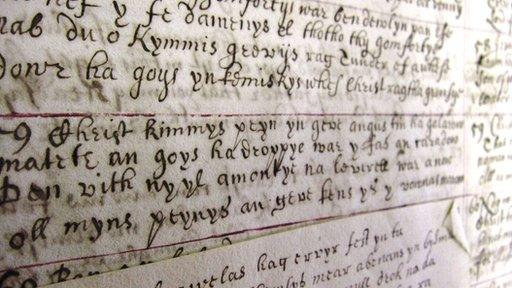Are lost languages coming back?
- Published
.jpg)
Adrian Cain and his four-year-old son Orry converse in Manx around the house
English may be the mainstay language of Britain and its islands, but it's far from the only tongue in town. But while languages like Welsh, Irish and Scottish Gaelic are fiercely protected, others are threatened.
"Vel oo geearree jough?" says Adrian Cain to his four-year-old son Orry who has stumbled into the kitchen in search of breakfast.
"Moghrey mie," replies Orry. "Kys t'ou?"
To English-speakers, this family scene must sound as if it is being played out in a language from some far-flung island.
But we are far closer to English shores than you might suppose.
For Manx is the native tongue of the Isle of Man.
The language is similar to Gaelic, says Mr Cain, who works at Culture Vannin, which promotes Manx culture.

The language is "part of what makes the Isle of Man what it is", says Mr Cain, a language officer
"It makes the Isle of Man what it is," he says. "But the last native speakers died in the 1970s. By the 90s, just a few people had learned it."
However, experts believe Manx is making a comeback.

Teach yourself Manx
Moghrey mie, kys t'ou? - Good morning. How are you?
Ta mee braew - I'm fine
Tooilley praaseyn my sailt - More potatoes please
Noddym jannoo jalloo hene mayrt? - Can I have a selfie with you?
Ta allerjee ayms roish kiyt - I am allergic to cats
Ta mee goll seose as goaill jeh m'edd - I am going upstairs to take off my hat

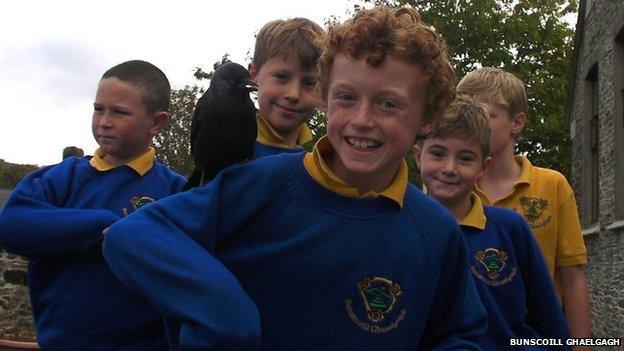
The Bunscoill Ghaelgagh is a Manx language school, set up by the island's government
At the Bunscoill Ghaelgagh, Orry's school, you will find part of the reason behind the resurgence.
Here, 70 children aged between four and 11 sit learning maths and poring over geography books, all in Manx.
The school was set up after campaigners lobbied the Manx government.
After starting out with just nine speakers in 2001, the school has grown consistently.
"Parents have different reasons for sending their children here," said head teacher Julie Matthews, herself a Manx speaker.
"Some speak Manx themselves and want their children to learn it. Others think a second language makes you more flexible in your thinking. And some like our creative teaching."

There is now a Manx version of the popular Gruffalo story
Nowadays, 1,800 people can speak Manx with varying degrees of ability. Crucially, most are young speakers.
GCSE and A Level equivalents can be taken in Manx and there is even a Manx translation of children's book The Gruffalo.
"There's been a real generational shift," said Mr Cain.

On the danger list
Manx: Critically endangered (spoken mainly by the grandparents' generation)
Cornish: Critically endangered
Guernesiais: Severely endangered (spoken mainly by the parents' generation)
Jèrriais: Severely endangered
Source: UNESCO

In Cornwall, language campaigners look on with envy.
"The Isle of Man has its own government, whereas we have to rely on funding from Westminster," said Loveday Jenkin from the Cornish Language Fellowship charity.
Last year, the campaign received £120,000, which will run out in April 2015. It is not clear whether it will receive any more.
"It's so difficult to get people in London to understand Cornish is a living, breathing language," said Mr Jenkin.
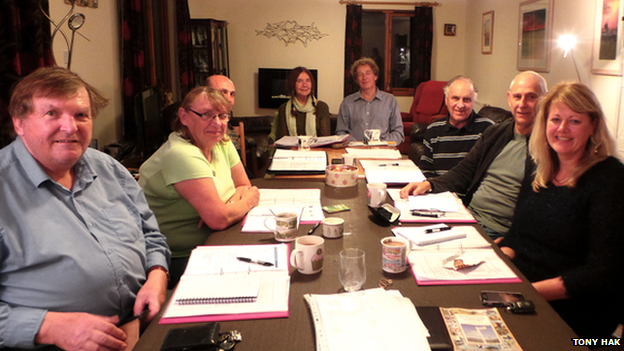
Some Cornish people seek to learn the language to "stay in touch with their roots"
He believes there are only "a few hundred" fluent Cornish speakers left. At one stage Cornish was classed as "extinct" by UNESCO, but campaigners have kept it going.
Tony Hak runs Friday night Cornish classes in London.
His 30 students are mainly Cornish ex-pats looking to stay in touch with their roots.
Awareness is growing, says Mr Hak.
"We have to turn people away," he said. "It's definitely more popular. But Cornish still needs help."

Teach yourself Cornish
What is the best way to the Eden Project? - Pyth yw an gwella fordh dhe'n Edenva?
I think we've run out of milk - Ni re worfennas an leth, dell grysav.
I'm a big fan of Rick Stein - Skoodhyer bras a Rick Stein ov.
I'd like to order a Cornish cream tea - My a garsa erghi te dehen kernewek.

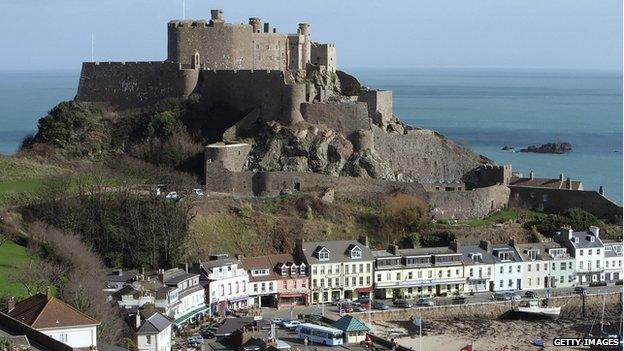
The historical language of Jersey is Jèrriais - a French-like language derived from Norman
Unlike Cornwall, the Channel Islands of Jersey and Guernsey have governments on their doorsteps.
For language champions, the challenge is to use the small army of native-speakers - generally aged over 60 - to enthuse the younger population.
The historical language of Jersey is Jèrriais - a French-like language derived from Norman.

Teach yourself Jèrriais
I would like to order a coffee with milk - Bailliz-mé, s'i' vos pliaît, un café au lait.
Does it contain peanuts? - Ch'est-i' qu'chenna contcheint des nouaix d'tèrre?
Go straight ahead and then turn right at the petrol station - Allez tout drait épis touônnez à drouaite à la pompéthie d'pétrole.
My car engine is making a funny noise - L'engîn d'ma vaituthe clianque au manche.

Tony Scott Warren from L'Office du Jèrriais - a language trust - remembers when Jèrriais was spoken across Jersey.
In 1986, there were 5,700 Jèrriais speakers but in 2001 that figure had dropped to 2,700.
"Most enthusiasts are in their 70s and 80s and are not going to become teachers," said Mr Scott Warren.

Native speakers of Jèrriais - often from the older generation - are keen to pass on their knowledge of the language
In Guernsey, speakers of the native language Guernesiais number less than 500 but hopes are high it could be back in fashion.
A translation service, set up by the island's Language Commission, has attracted a wave of requests for Guernesiais phrases for weddings, headstones and even tattoos.
"Language is very emotive and part of your identity," said Josephine Dowding, from the commission.

Guernsey weddings and tattoos
I will love you forever - J't'oïmerai à jaumais
For my husband/for my wife - Pour m'n Haome/Pour ma Faume
One perfect year - énne parfaete onnaïe
Fortune favours the brave - Lé bouneur favorise les tchérus

The commission, set up in 2013, co-ordinates the island's many Guernesiais groups - ranging from a dance group to a choir.
"There's a good vibe around Guernesiais now," said Ms Dowding.
"In this vanilla-coloured world, it's important people appreciate what's on their doorstep - and that includes the quirky nature of indigenous languages."
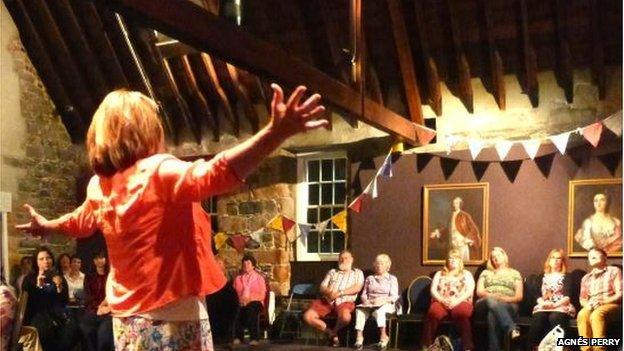
There are many Guernesiais-speaking projects on the island
But why is it so important to retain languages with - at best - a few thousand speakers when almost all Britons speak English?
"There are all sorts of reasons why we should stop smaller languages being engulfed by the big beasts," said Christopher Moseley, a University College London lecturer and the editor of the UNESCO Atlas of the World's Languages in Danger.
"Each language represents a different world of thought - centuries of collected wisdom."
Some languages, he believes, have disappeared - the island of Alderney's, for example.
However, his latest report into the findings, for GoEuro, suggests the Manx revival could see it moved out of its "critically endangered" category within decades.
"It's very heartening," he said. "No other European language has been turned around from such a dire position."
- Published30 January 2013
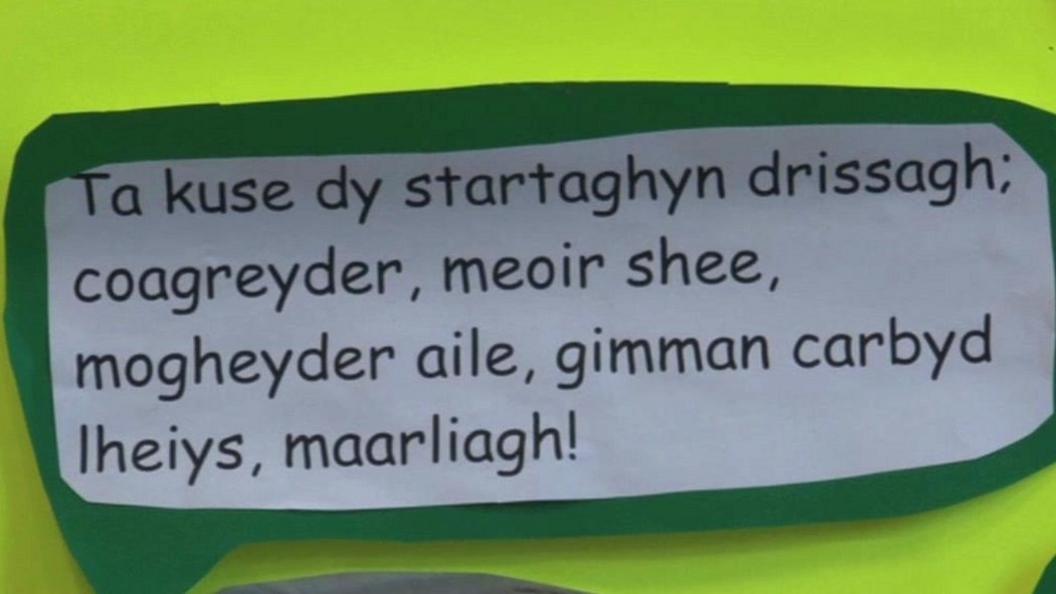
- Published24 January 2013
